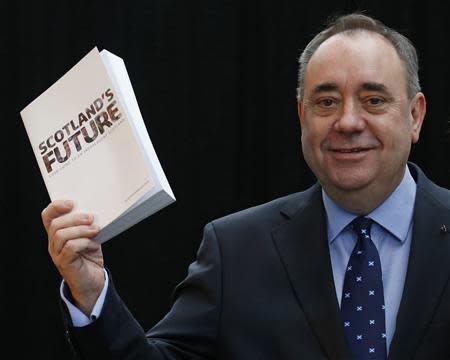Battle lines drawn as Scotland unveils independent future
By Belinda Goldsmith GLASGOW, Scotland (Reuters) - The Scottish government unveiled its long-awaited vision for independence on Tuesday, promising Scots they could forge their own prosperity but keep the pound and the queen if they vote next year to end a 306-year-old union with England. With separatists lagging in opinion polls, First Minister Alex Salmond said an independent Scotland would take charge of its own finances, raising taxes and spending revenues from North Sea oil and gas reserves as it sees fit. Launching a 670-page blueprint for independence, he said the country would also run its own defence force, expelling nuclear submarines from Scotland, while a new publicly funded broadcaster would form a joint venture on content with the BBC. But it would also seek to preserve major bonds with the United Kingdom, including the British pound and the monarchy, and remain a member of the European Union and NATO. "We know we have the people, the skills and resources to make Scotland a more successful country," Salmond told a news conference at the Glasgow Science Centre on the bank of the River Clyde, once home to a booming shipbuilding industry. "Scotland's future in now in Scotland's hands." The "landmark paper" was released 10 months before the single vote on independence for Scotland's five million people, and after a weekend opinion poll suggested the gap in support between the 'Yes' and 'No' camps is narrowing. The poll for the Sunday Times newspaper showed 38 percent of Scots backed quitting the UK, with 47 percent opposing it and 15 percent undecided. With so many Scots yet to make up their minds, pro-union leaders have warned against complacency. The weighty prospectus immediately came under fire for being big on political promises but short on detail, with important elements needing approval from outside Scotland and no alternatives given for if Scotland did not get its own way. Salmond, feisty leader of the Scottish National Party, which dominates the devolved Scottish parliament, has put economic gains at the heart of his case for independence - to start on March 24, 2016, the anniversary of the 1707 Act of Union. He promised to cut corporation tax by up to 3 percentage points to boost investment and industry and help create jobs. "NOT IN SCOTLAND'S HANDS" Salmond brushed off a report released by the UK Treasury on Tuesday that said independence would cost Scottish taxpayers an extra 1,000 pounds a year by the end of this decade, saying there would be no need to raise taxes to fund current spending. He also downplayed risks that the rest of the UK would refuse to let Scotland share the pound, with the currency becoming a major issue as the independence debate heats up. Politicians from both sides had agreed that if Scotland seceded, any joint assets and liabilities would be handled in the interests of Scotland and the rest of the UK, Salmond said -including the Bank of England and the pound. "A sterling area is not just in the best interests of Scotland but in the best interests of the rest of the UK," he added, emphasising their strong trading relationship. "There would be a massive hole in the sterling balance of payments ... if Scottish oil and gas is not part of exports." But the British government, which has toughened up its language in recent weeks, said the SNP's plan to keep the pound and retain the services of the Bank of England as part of a "currency union" with the rest of the UK would not work. "As the government has consistently said, in the event of independence, a currency union is highly unlikely," said a spokesman for Prime Minister David Cameron after the launch. Britain's three main UK-wide political parties have argued against independence, saying Scotland would be worse off economically on its own and unable to defend itself or project power on the global stage as well as it can as part of the UK. Pro-union campaigners were quick to point out the final decision on whether Scotland keeps the pound was just one of many plans in the report that were not in Scotland's control. But Salmond dismissed suggestions that an independent Scotland would struggle to join NATO if it removed the UK's Trident nuclear deterrent from Scotland as planned by 2021, or would be refused membership of the EU. He said stopping spending "billions of dollars on weapons of mass destruction" would free up funds for other spending, pledging to extend free childcare to pre-school children and cut an unpopular "bedroom tax" on those deemed to have spare rooms. Nicola Sturgeon, Scotland's deputy first minister, described the document as "the most comprehensive and detailed blueprint ever drawn up for a prospective independent country". Scotland's bid for independence is being watched closely internationally, particularly in Catalonia where 80 percent of people favour a vote for independence from Spain. But the UK's Scotland secretary Alistair Carmichael described the paper as "a wish with no price list". "The big day has finally arrived and we have 670 pages that leaves us none the wiser on crucial questions such as currency, pensions and the cost of independence," Carmichael said. (Additional reporting by Fiona Ortiz in Madrid, William James in London,; Editing by Stephen Addison and Catherine Evans)




